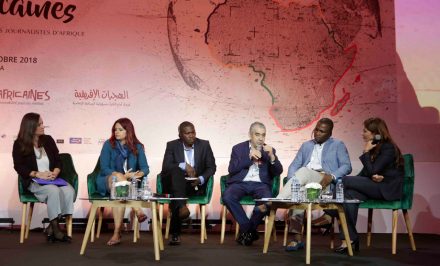 Côte d’Ivoire: Patricia Claude Kalou, passion and commitment to audiovisual and cinéma
Côte d’Ivoire: Patricia Claude Kalou, passion and commitment to audiovisual and cinéma
 Felicia Nja-Njobaya Motia, the young leader championing regenerative agriculture in Cameroon
Felicia Nja-Njobaya Motia, the young leader championing regenerative agriculture in Cameroon
 Laure Beyala, the Franco-Cameroonian engineer promoting digital health
Laure Beyala, the Franco-Cameroonian engineer promoting digital health
 Rapelang Rabana, the computer scientist who wants to revolutionise learning in South Africa
Rapelang Rabana, the computer scientist who wants to revolutionise learning in South Africa


An exciting debate at the second edition of the Forum “Les Panafricaines”
Casablanca, October 26, 2018- The second edition of the Forum of African Women Journalists “Les Panafricaines” included a big debate on the theme: “”FROM ONE BANK TO THE OTHER, FOR AN OBJECTIVE LOOK AT THE MIGRANTS”. This exchange brought together journalists and experts around the migration issue.
The debate was moderated by Samira Sitaïl, Deputy Managing Director in charge of Information and Magazines at 2M, who began by clarifying the issue at the heart of this debate, namely the distortion of the image of migrants. For if humanitarian crises, persecutions, and civil wars cannot be overshadowed, they are subject to treatments that are so simplistic and partial that they have come to constitute the only reality that characterizes migratory flows, in the eyes of public opinion in both host countries and countries of emigration.
In this sense, Ana Fonseca, head of the mission of the International Organization for Migration in Morocco stressed that the treatment of migration must be done through a human prism, because “At the heart of what is called migratory flows, there are particular people who need protection”.
This position is supported by Driss El Yazami, President of the National Human Rights Council who recalled that “the migrant has fundamental rights that must be respected, regardless of his legal status.”
This status raises a fundamental question, said Samira Sitail, that of the impact that terminologies adopted to describe migrants can have, especially in the Western media. Migrants legal, illegal, clandestine… meaningful terms that distort reality and convey a false and biased image of African migration.
Larry Macaulay (Nigeria), founder and editor-in-chief of the Refugee Radio Network in Hamburg, Germany, said that the deconstruction of prejudice is primarily the responsibility of Africans: “Us migrants, us Africans, us foreigners, we have the responsibility to change our image. It is necessary to reflect the true image of Africa, and not wait for the West to shape it. We have to show the European media that we can organize ourselves as Africans in a constructive and thoughtful way.”
” Public opinion should be listening,” says Raffaella Consentino (Italy), Reporter for the television channel “Rai”, specializing in migration issues.
To the question of the rise of the xenophobic and racist discourse in Europe, especially in Italy, she answers: “the political messages conveyed in Italy, by the populist extreme right for example, worry the civil society a lot”. For this journalist who spent a lot of time in Lampedusa, “all that Italians know about migration are the images of massive arrivals of sub-Saharan migrants on the Italian coast”.
For this image to evolve, according to Patrick Otim (Uganda), a specialist in migration and a member of Refugee Law Project in Kampala, it is important “to have precise figures” to make an accurate assessment of the situation. Then, “we must make the voices of migrants heard, because one must have lived the migration, in order to talk about it with accuracy”.
The Q&A session with the audience lasted more than an hour, and speakers were asked about the importance of moving out of the North-South prism and including the issue of the treatment of migrants within Africa itself.
For Larry Macaulay, the solution must be found both at the level of the civil action and that of the political decision makers, who must lead a concerted continental action. “We need to talk to our leaders at the highest level, at the level of the African Union”.
“We must also prepare for the implementation of the Global Pact for Migration, which will be adopted in Marrakech on December 10”, said Ana Fonseca. “It is time to move from words to action, to implement result-oriented strategies”.
This pragmatic implementation of the Pact was encouraged by Driss El Yazami which stressed that the national human rights entities are designed as an essential tool for its implementation. We need to mobilize the African capacity, and develop an African point of view on human rights.”
Regarding the migration policies put in place by African countries, particularly transit countries, Ana Fonseca declared that “there is a balance to be struck between state sovereignty and the rights of migrants, but it is important not to leave a vacuum that can be exploited by criminal networks.”
This was an exciting, rich and humane debate on the importance of giving migrants their rightful place in society. “Refugees are not aliens, they are part of our society” said Patrick Otim, while Driss El Yazami concluded “Human mobility is an extraordinary wealth that must be valued.”